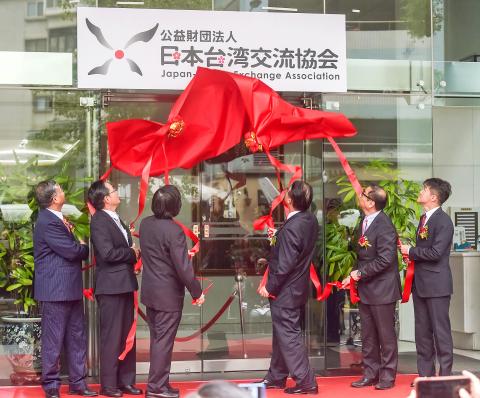Japanese Representative to Taiwan Mikio Numata yesterday said that he hoped Taipei and Tokyo could take their “best relationship” to the next level, as he unveiled the new doorplate for the Japan-Taiwan Exchange Association, which on Sunday changed its name from the Interchange Association, Japan.
In his unveiling ceremony speech, Numata said since the association’s establishment in December 1972, Taiwan and Japan have rapidly “developed a friendly relationship that is rare around the world.”
“At that time, bilateral trade between the two sides only amounted to about US$1 billion, but that climbed to US$57.9 billion in 2015. As for bilateral visits, only 200,000 visitors were recorded in 1972, but in 2015 we saw a record-high 6 million visitors,” Numata said.

Photo: Huang Yao-cheng, Taipei Times
Assistance offered by Taiwanese in the wake of major earthquakes that hit Japan in 2011 and last year has also brought the two nations closer together, Numata said.
The name change came following a survey early last year, which found that only 14 percent of Taiwanese respondents knew about the association, Numata said, adding that he hoped the inclusion of Taiwan in the association’s name would change that.
“The unveiling ceremony also marks a new chapter in the Taiwan-Japan relationship. Let us work together on bilateral ties, which are already at their best in history,” Numata said.
The association represents Japan’s interests in Taiwan in the absence of diplomatic ties, which ended in 1972, when Taiwan set up a quasi-official organization, the Association of East Asian Relations, to handle ties with Japan.
In 1992, the association’s Tokyo office changed its name to the Taipei Economic and Cultural Representative Office in Japan, which serves as Taipei’s de facto embassy in Tokyo.
Association of East Asian Relations president Chiou I-jen (邱義仁) congratulated the Japanese association on its “name change,” which he said took many predecessors tremendous time and effort.
“This outcome carries more than a symbolic meaning and is not just a superficial name change,” Chiou said.
Taiwanese independence groups cheered the name change outside of the ceremony.
“It is another giant step toward correcting our name to ‘Taiwan’ in the international community,” the group 908 Taiwan Republic Campaign said in a news release yesterday, urging the Association of East Asian Relations to change its name to the “Taiwan-Japan Exchange Association.”

DAREDEVIL: Honnold said it had always been a dream of his to climb Taipei 101, while a Netflix producer said the skyscraper was ‘a real icon of this country’ US climber Alex Honnold yesterday took on Taiwan’s tallest building, becoming the first person to scale Taipei 101 without a rope, harness or safety net. Hundreds of spectators gathered at the base of the 101-story skyscraper to watch Honnold, 40, embark on his daredevil feat, which was also broadcast live on Netflix. Dressed in a red T-shirt and yellow custom-made climbing shoes, Honnold swiftly moved up the southeast face of the glass and steel building. At one point, he stepped onto a platform midway up to wave down at fans and onlookers who were taking photos. People watching from inside

A Vietnamese migrant worker yesterday won NT$12 million (US$379,627) on a Lunar New Year scratch card in Kaohsiung as part of Taiwan Lottery Co’s (台灣彩券) “NT$12 Million Grand Fortune” (1200萬大吉利) game. The man was the first top-prize winner of the new game launched on Jan. 6 to mark the Lunar New Year. Three Vietnamese migrant workers visited a Taiwan Lottery shop on Xinyue Street in Kaohsiung’s Gangshan District (崗山), a store representative said. The player bought multiple tickets and, after winning nothing, held the final lottery ticket in one hand and rubbed the store’s statue of the Maitreya Buddha’s belly with the other,

‘COMMITTED TO DETERRENCE’: Washington would stand by its allies, but it can only help as much as countries help themselves, Raymond Greene said The US is committed to deterrence in the first island chain, but it should not bear the burden alone, as “freedom is not free,” American Institute in Taiwan Director Raymond Greene said in a speech at the Institute for National Defense and Security Research’s “Strengthening Resilience: Defense as the Engine of Development” seminar in Taipei yesterday. In the speech, titled “Investing Together and a Secure and Prosperous Future,” Greene highlighted the contributions of US President Donald Trump’s administration to Taiwan’s defense efforts, including the establishment of supply chains for drones and autonomous systems, offers of security assistance and the expansion of

STREAMLINED: The dedicated funding would allow the US to transfer equipment to Taiwan when needed and order upgraded replacements for stockpiles, a source said The US House of Representatives on Thursday passed a defense appropriations bill totaling US$838.7 billion, of which US$1 billion is to be allocated to reinforcing security cooperation with Taiwan and US$150 million to replace defense articles provided to the nation. These are part of the Consolidated Appropriation Act, which the US House yesterday passed with 341 votes in favor and 88 against. The act must be passed by the US Senate before Friday next week to avoid another government shutdown. The US House Committee on Appropriations on Monday unveiled the act, saying that it allocates US$1 billion for the Taiwan Security Cooperation Initiative